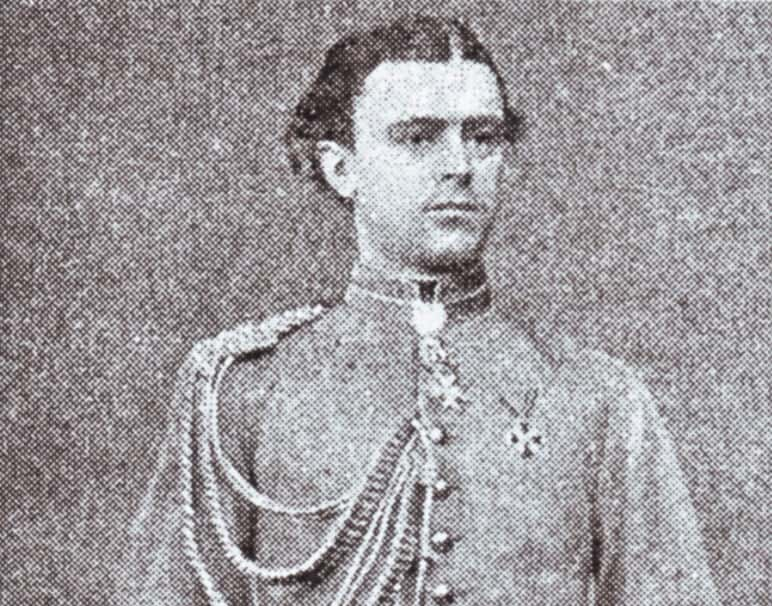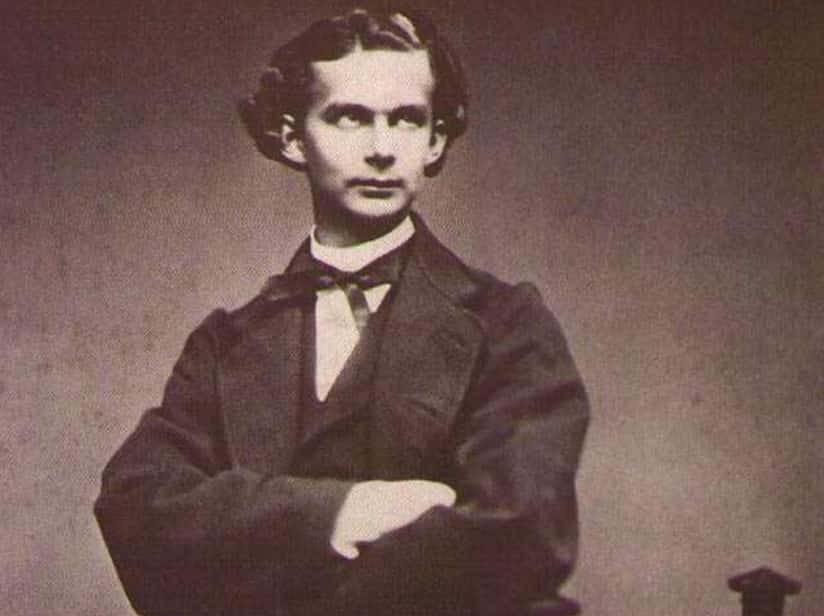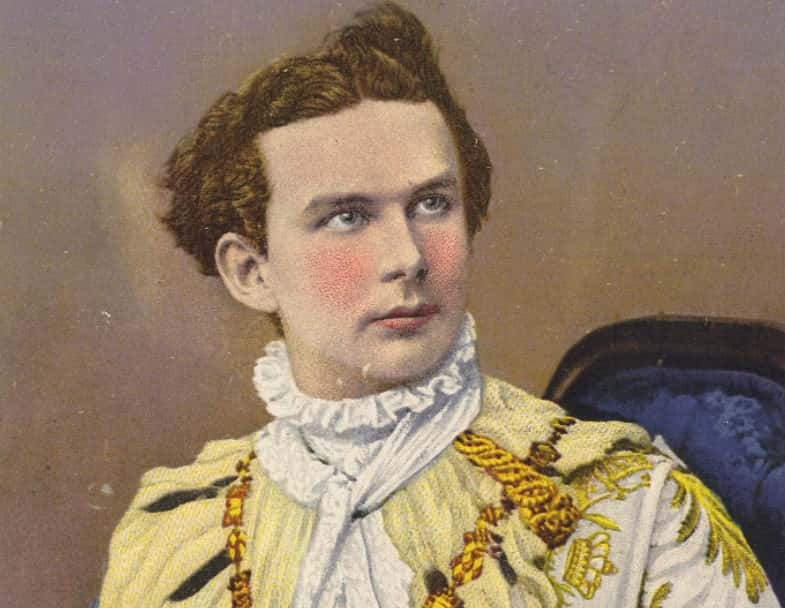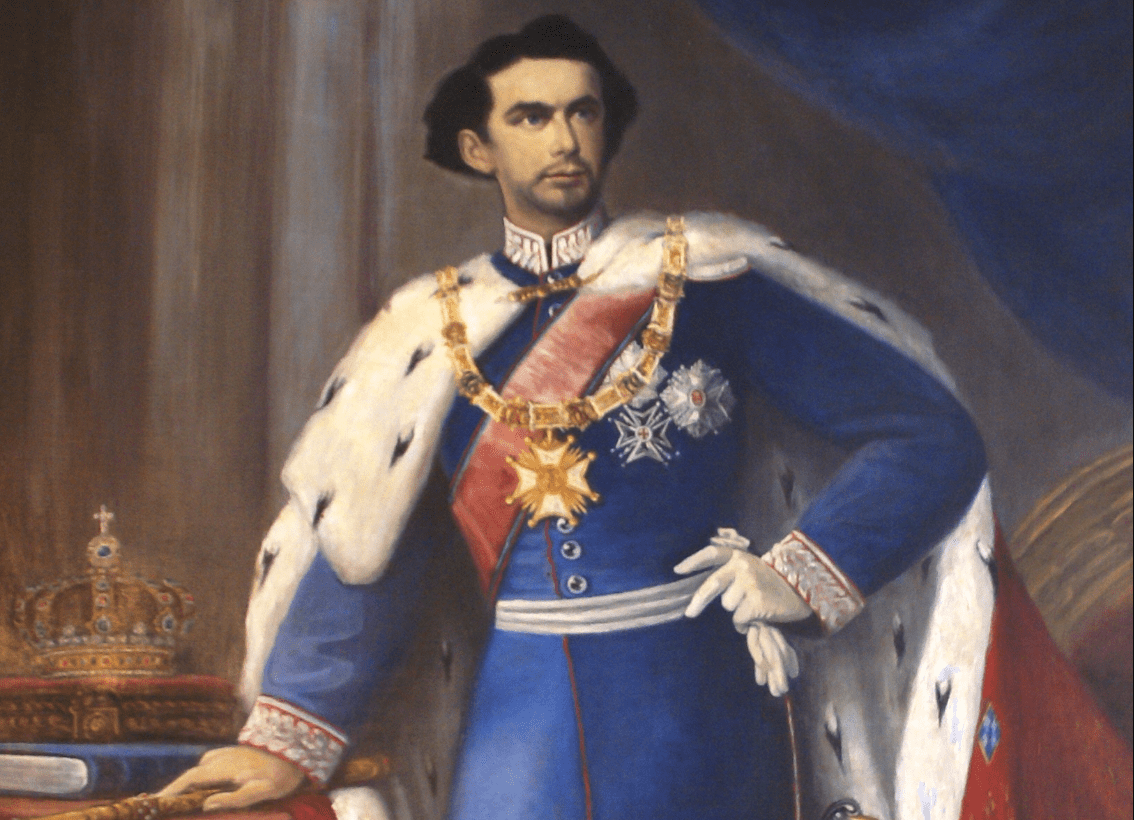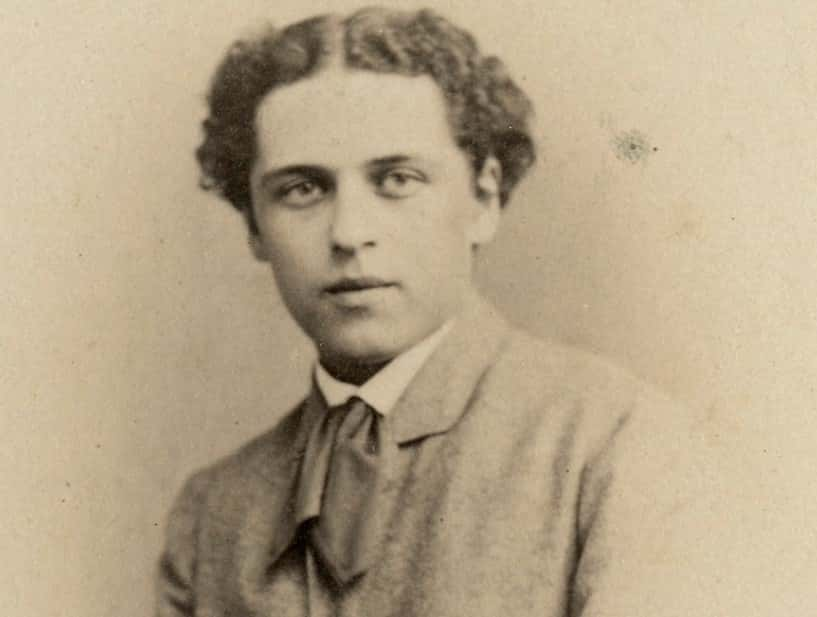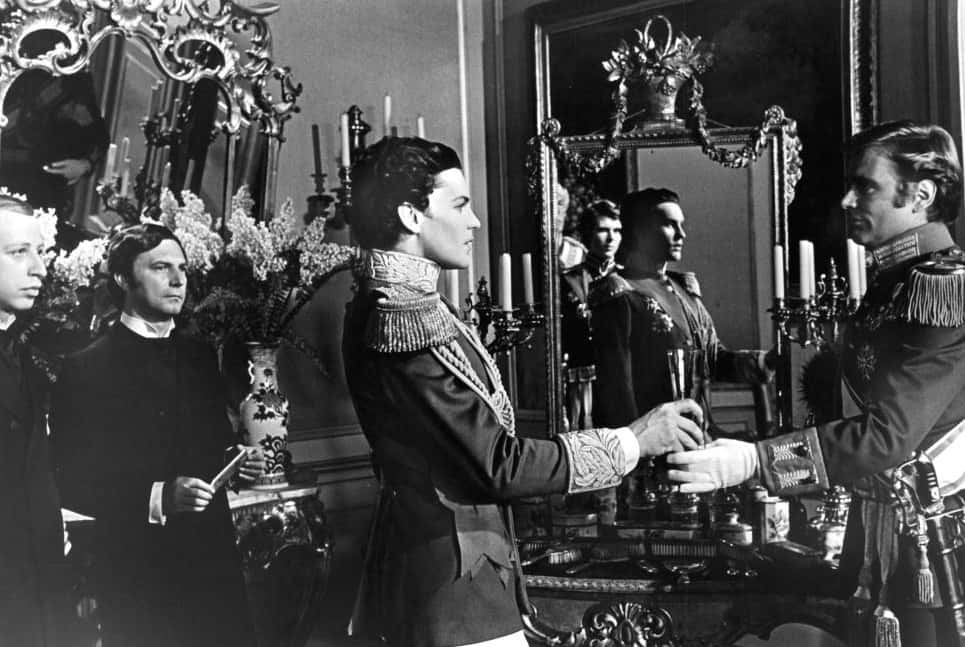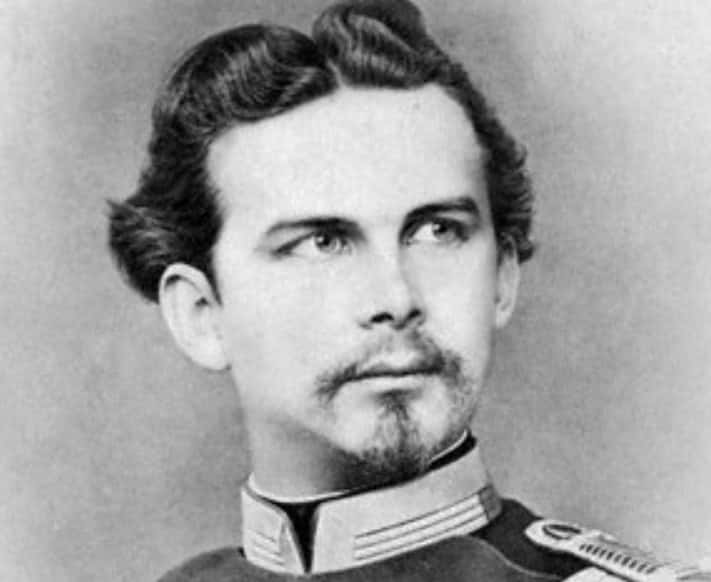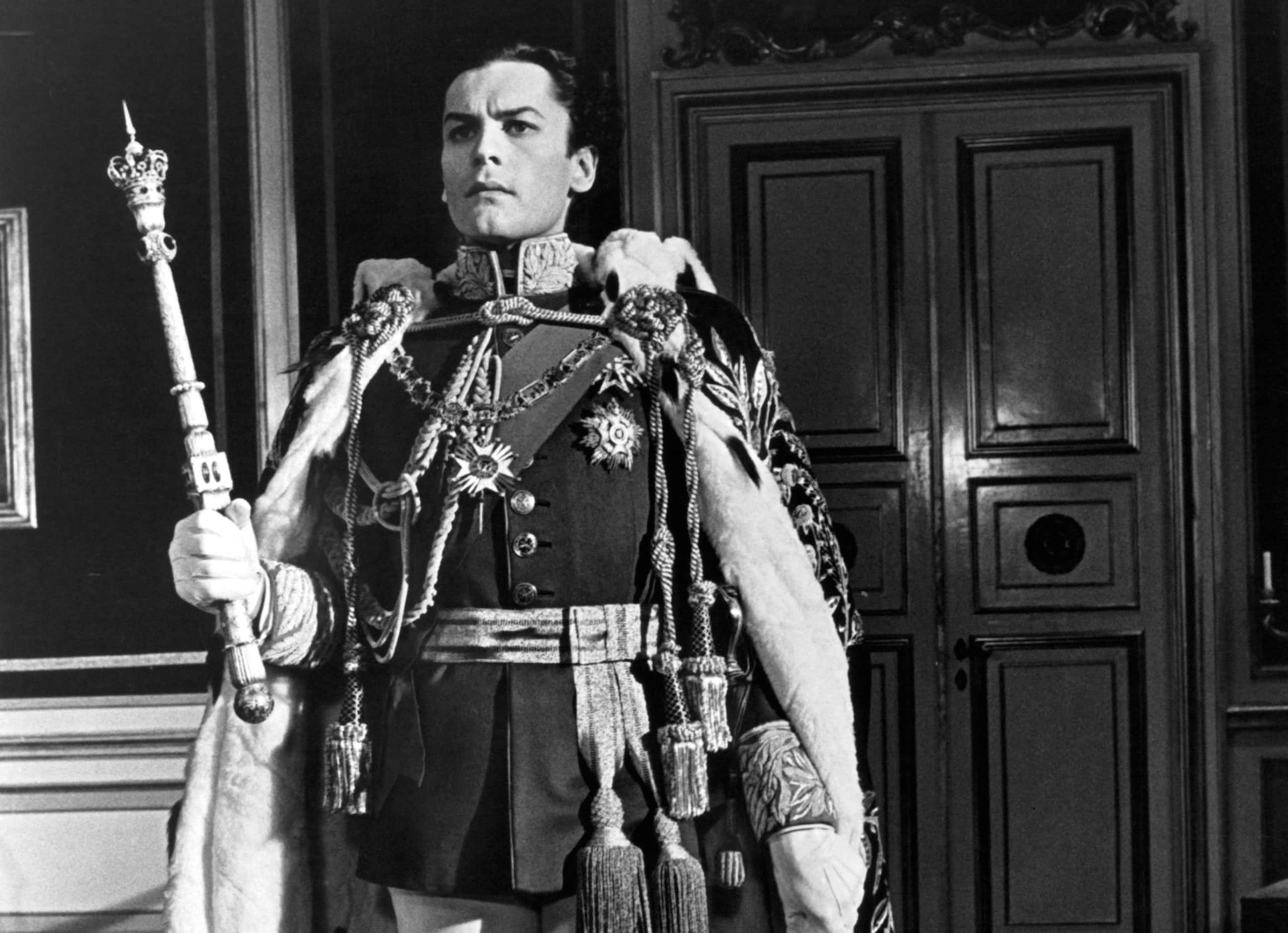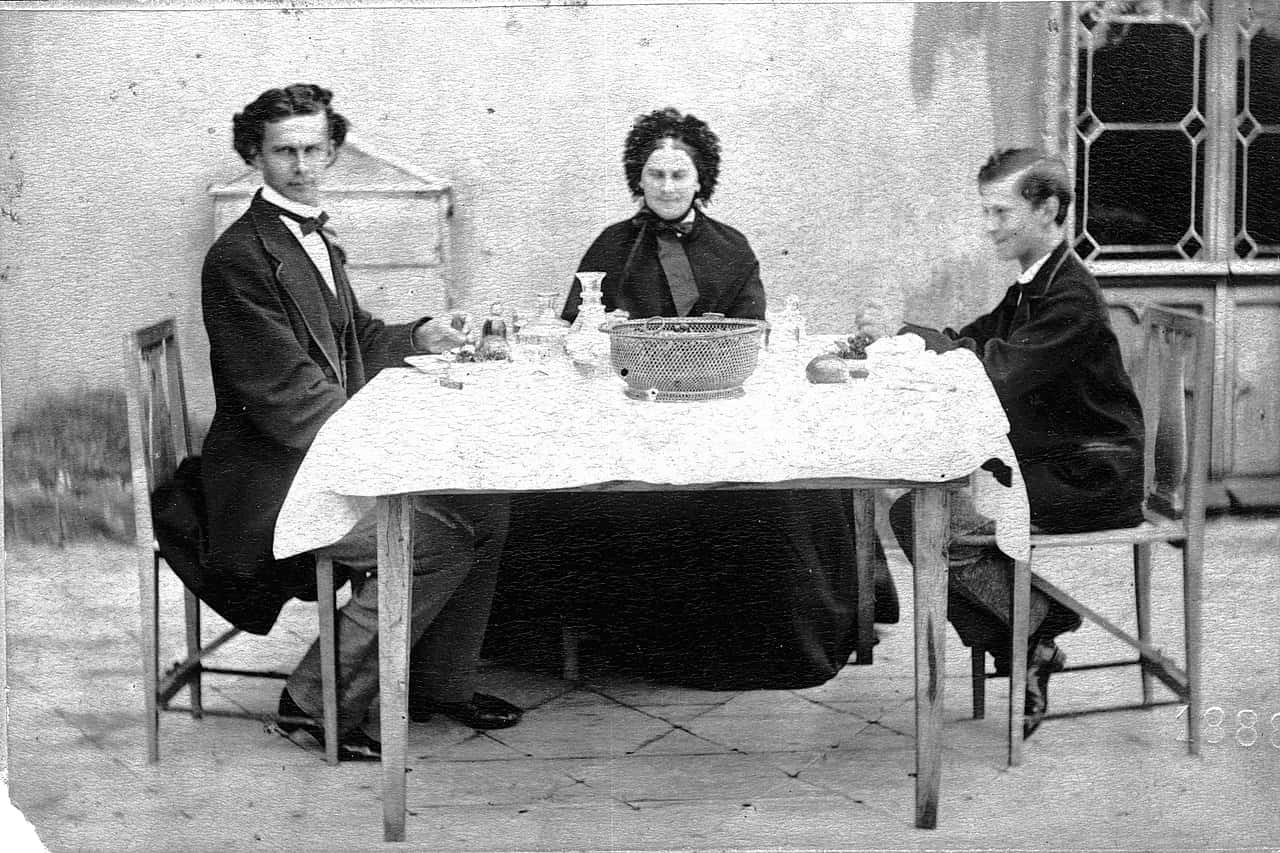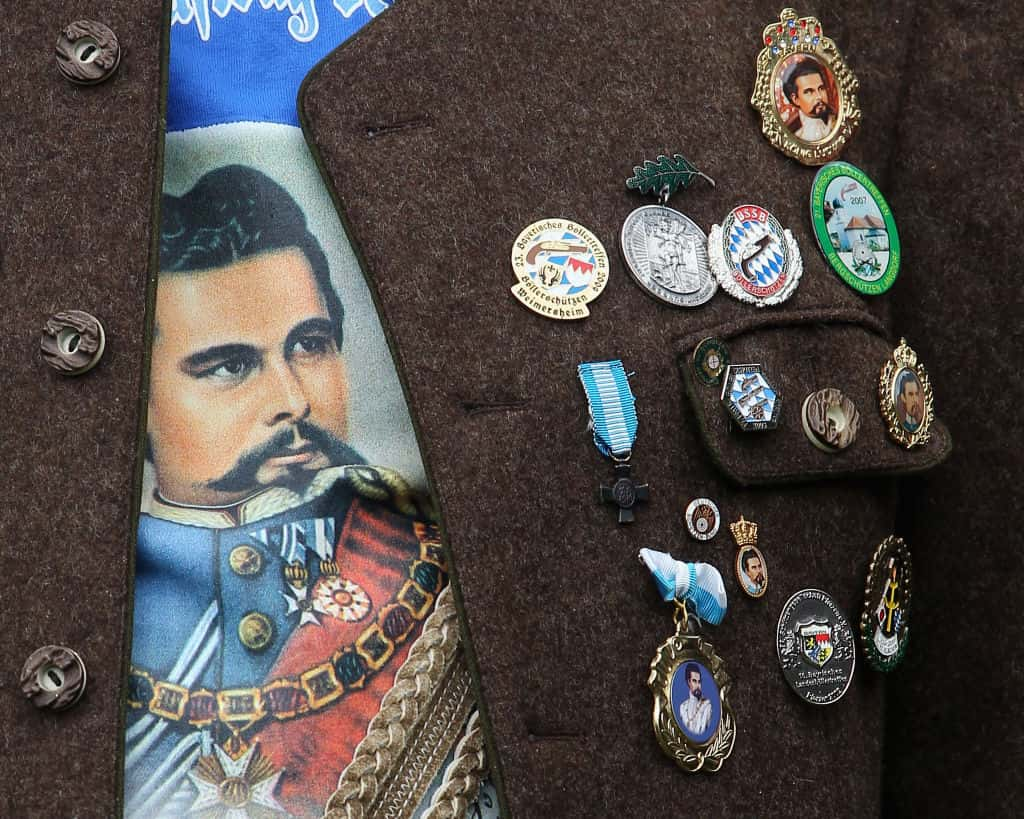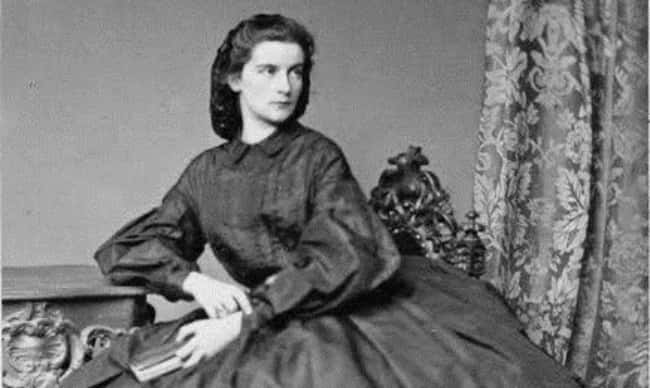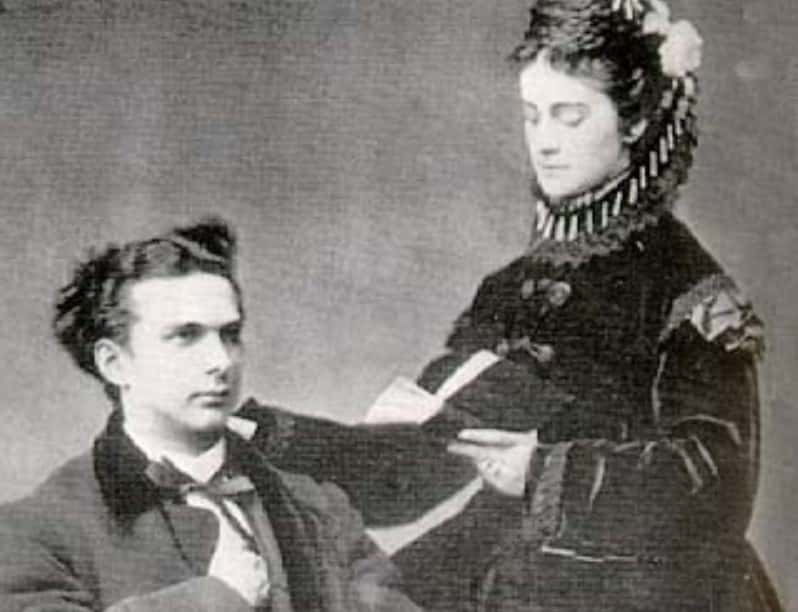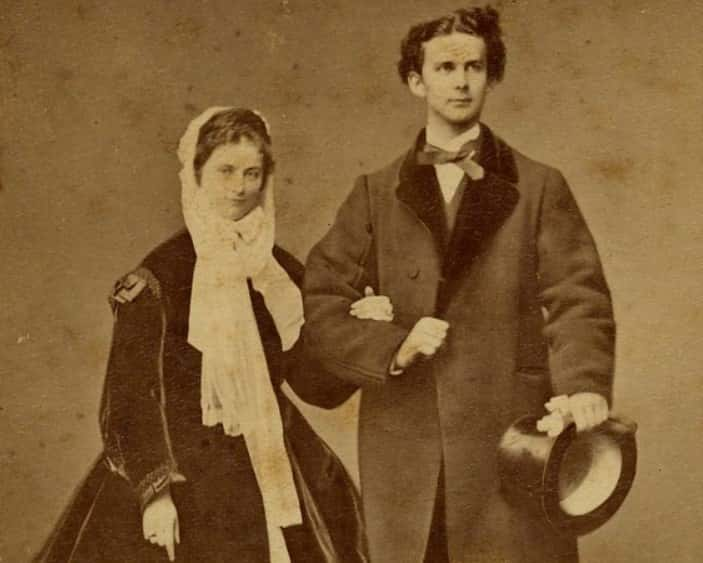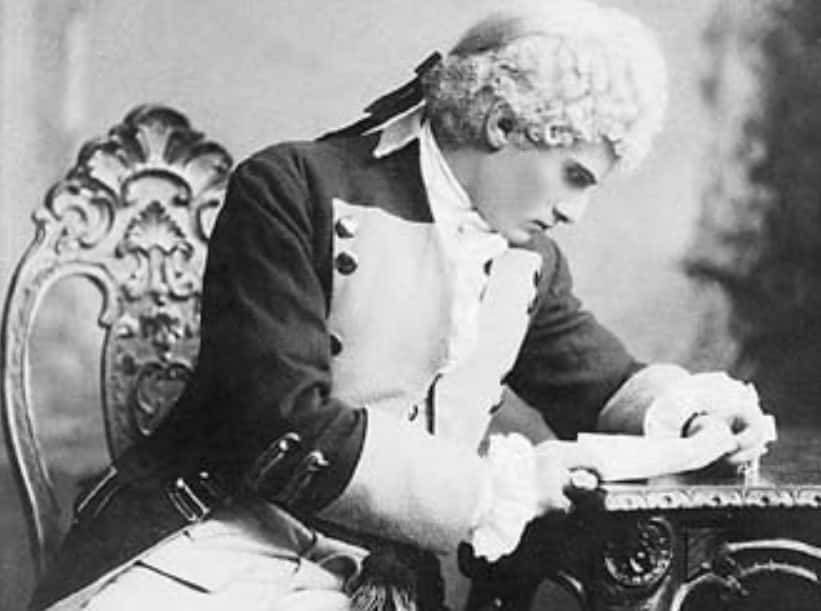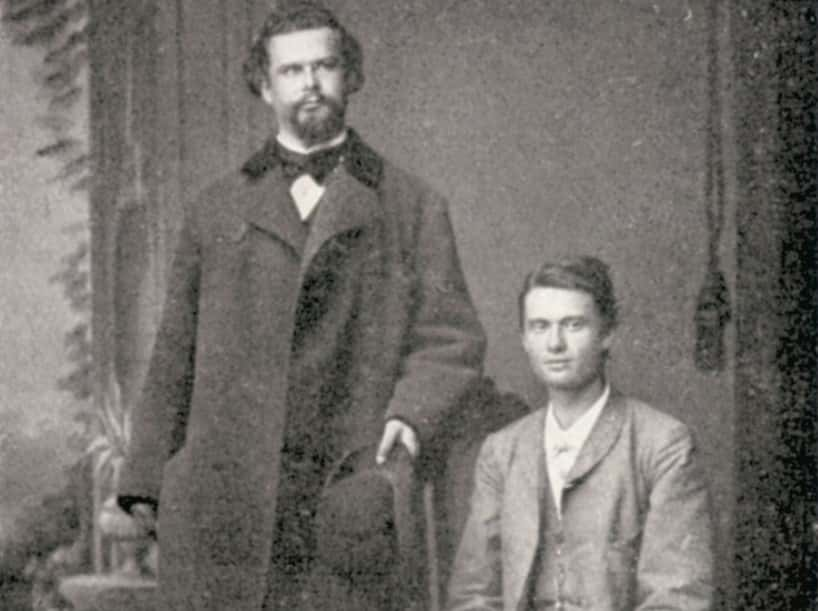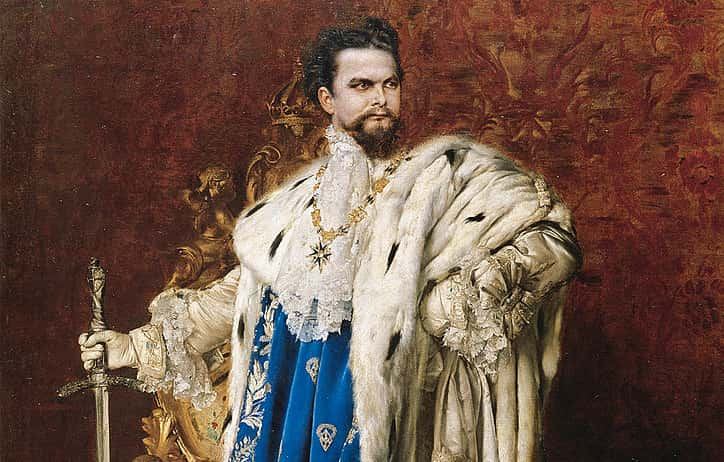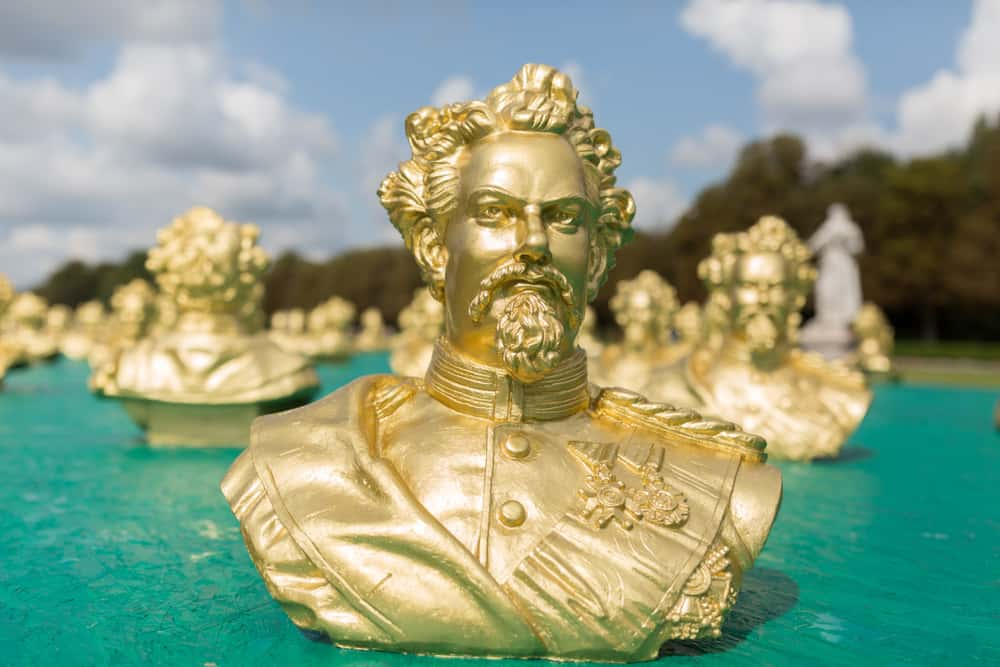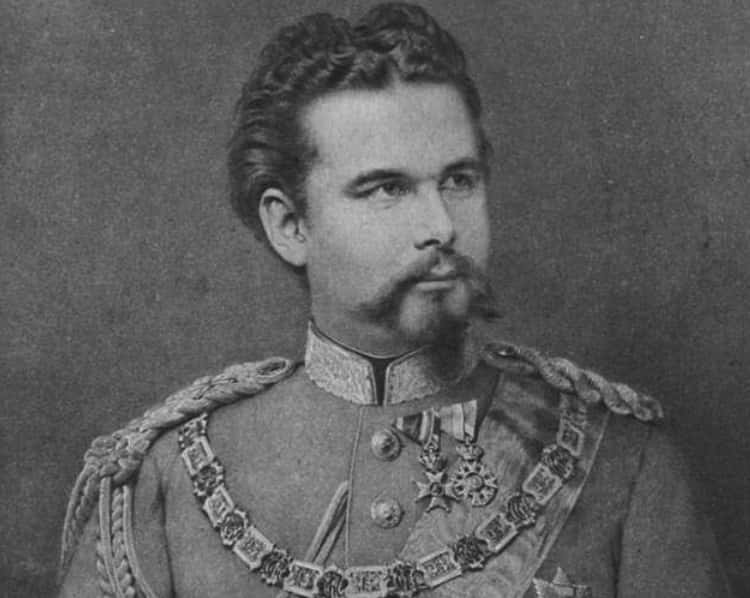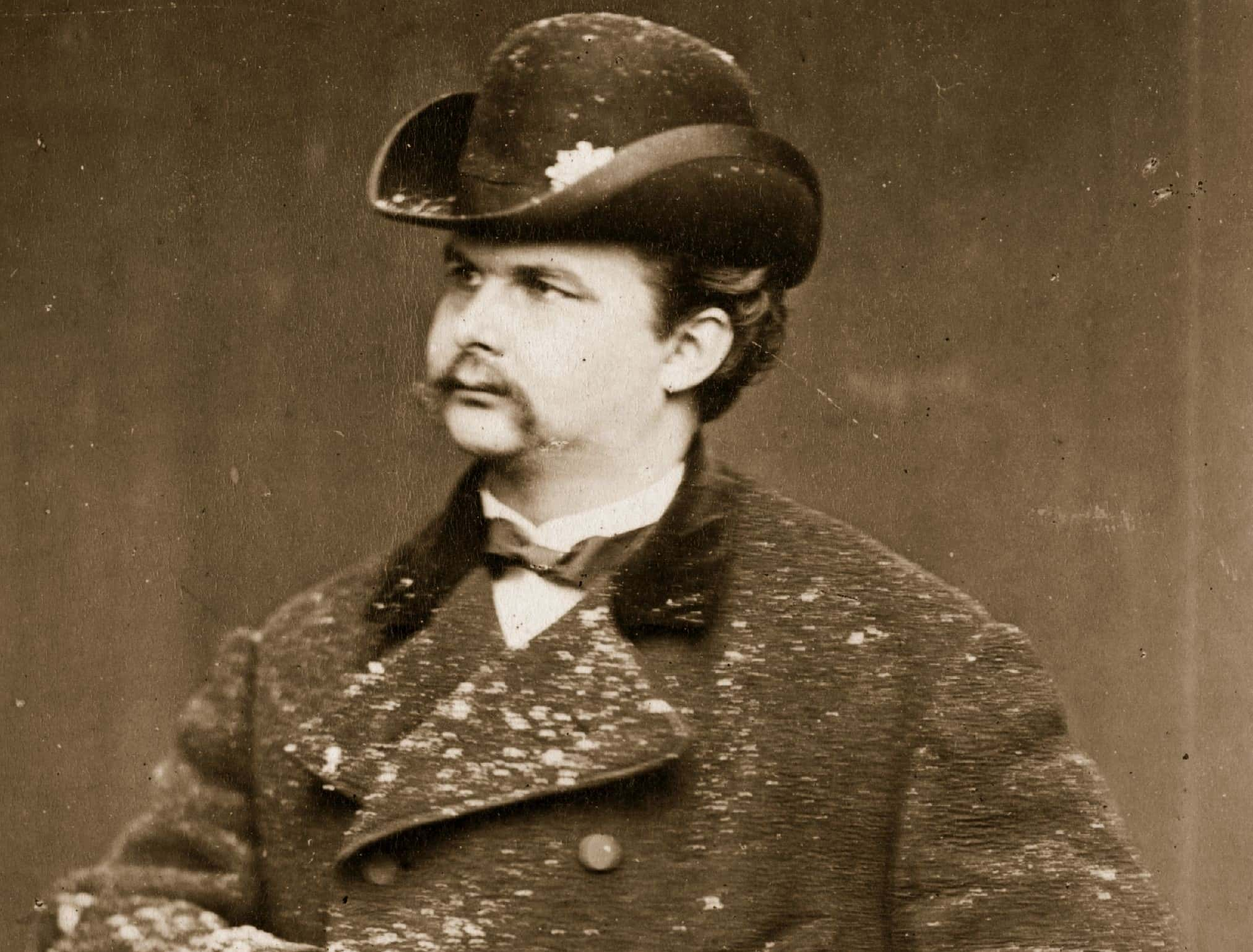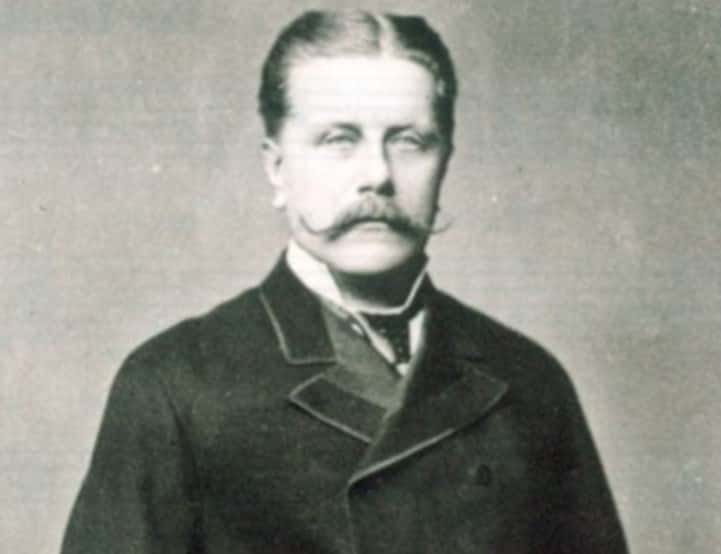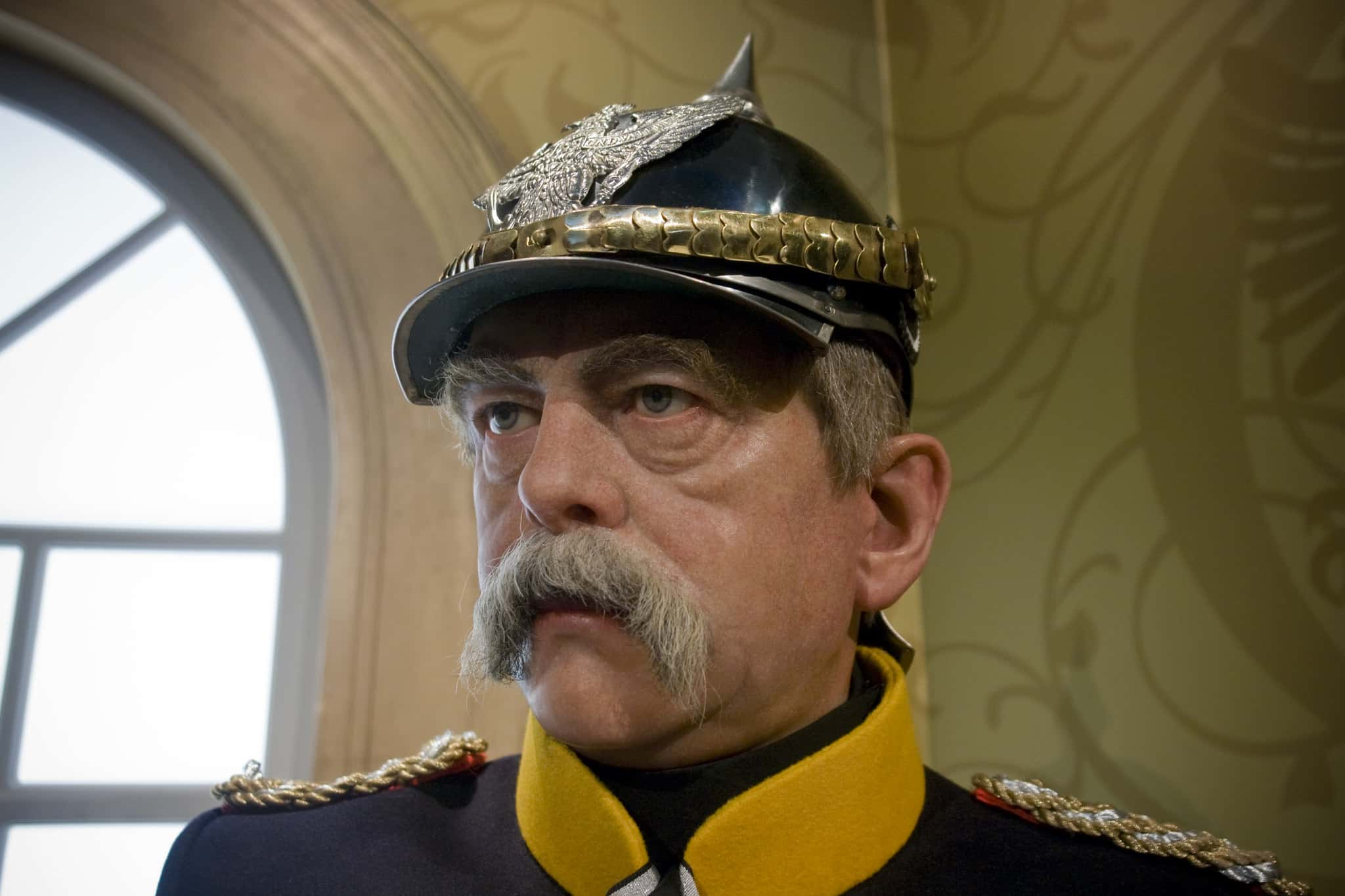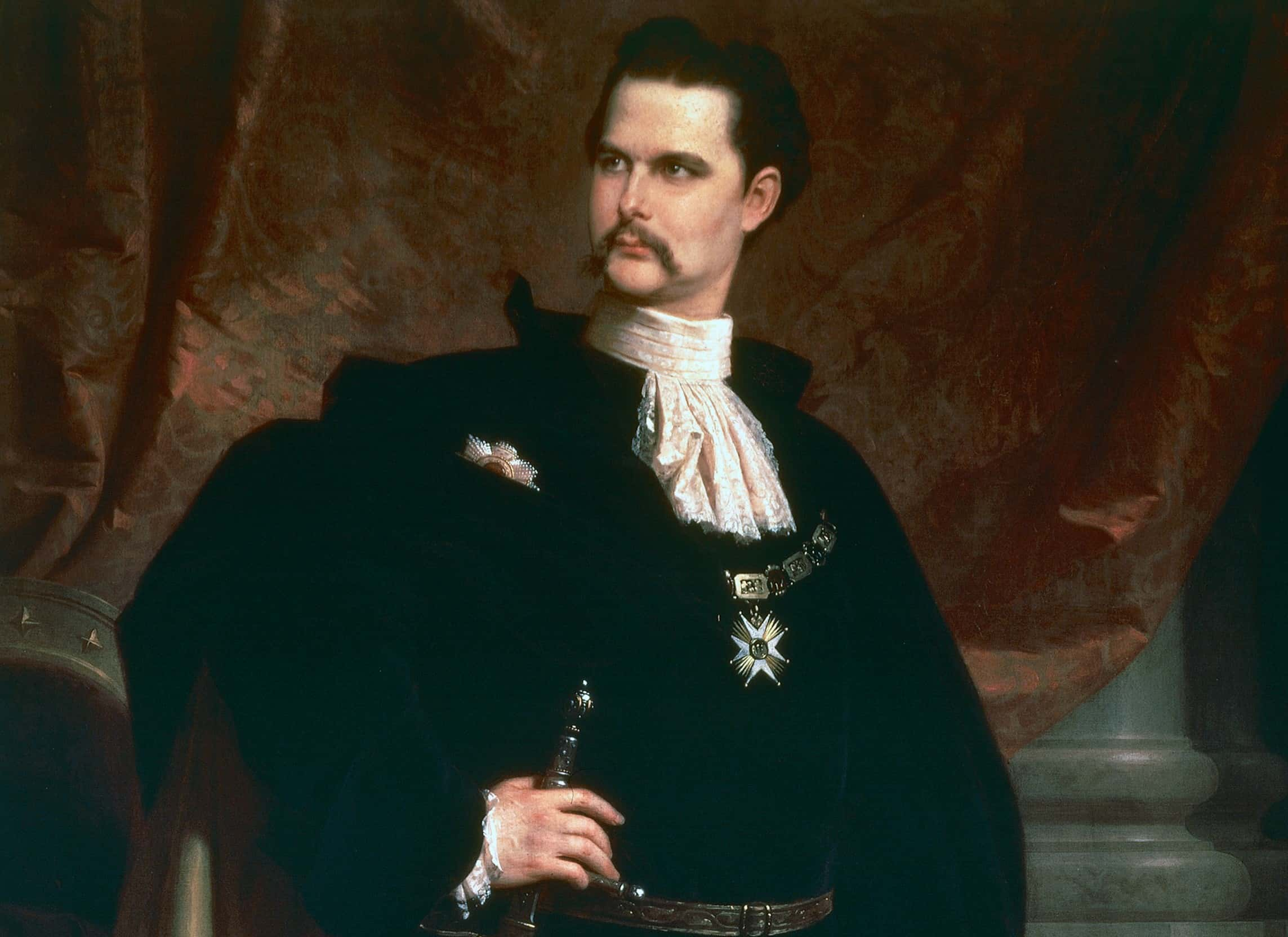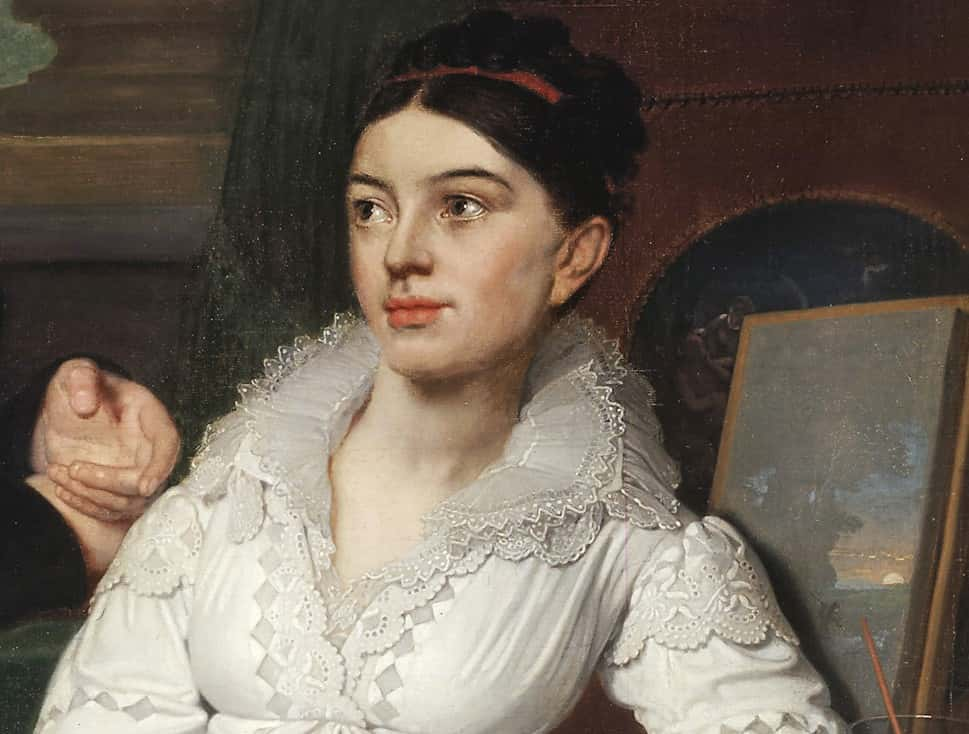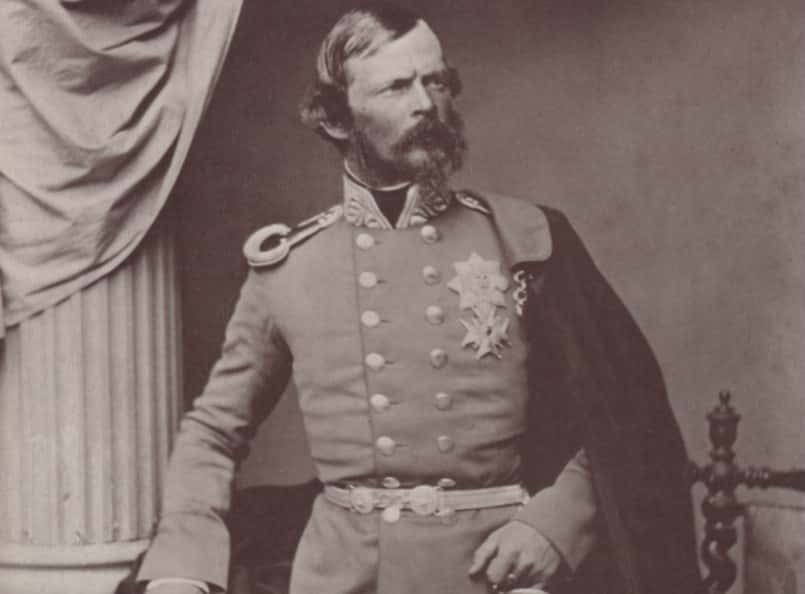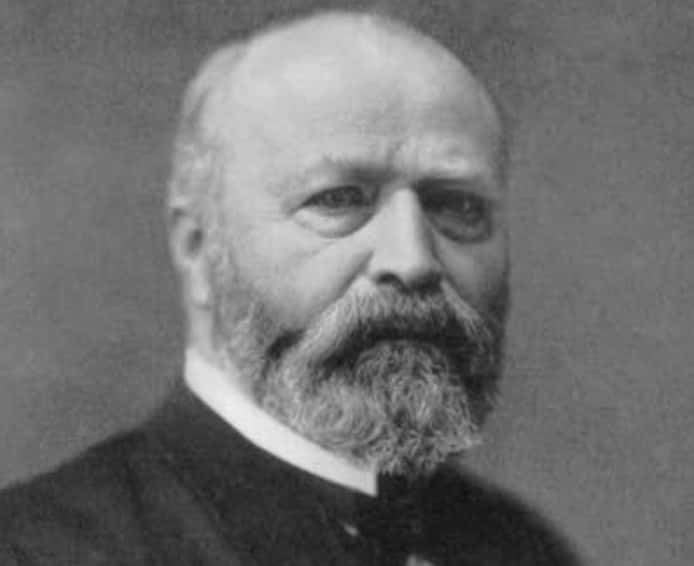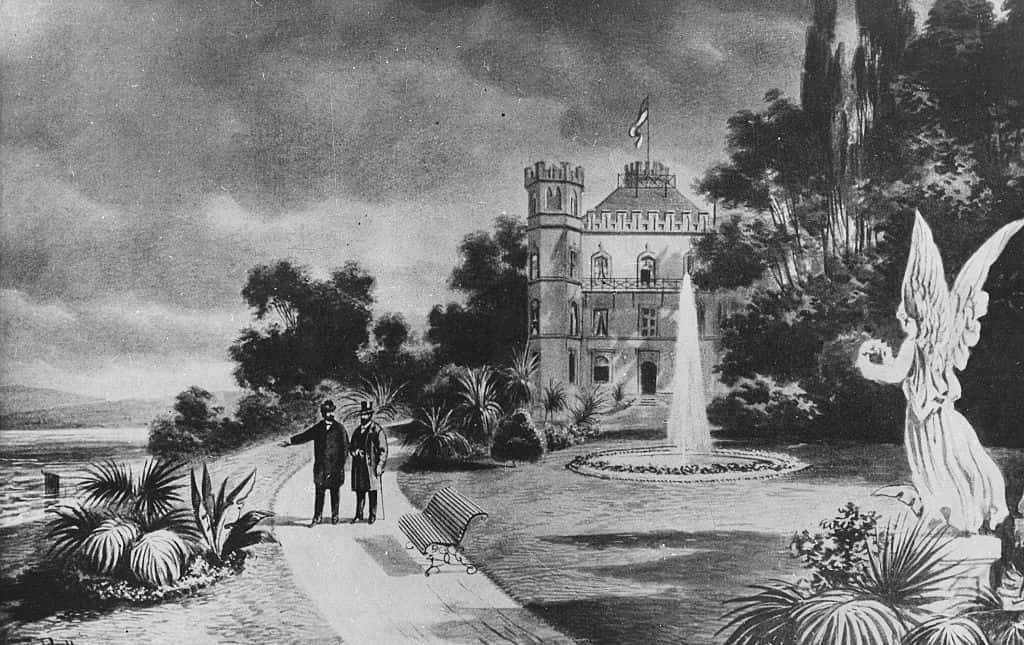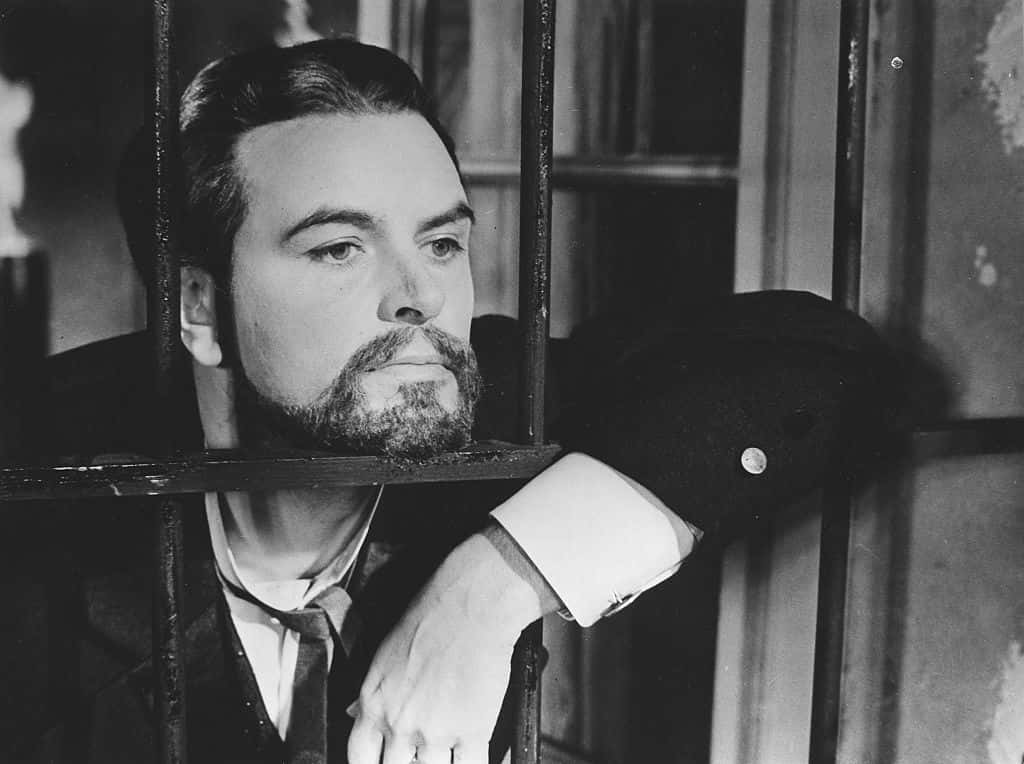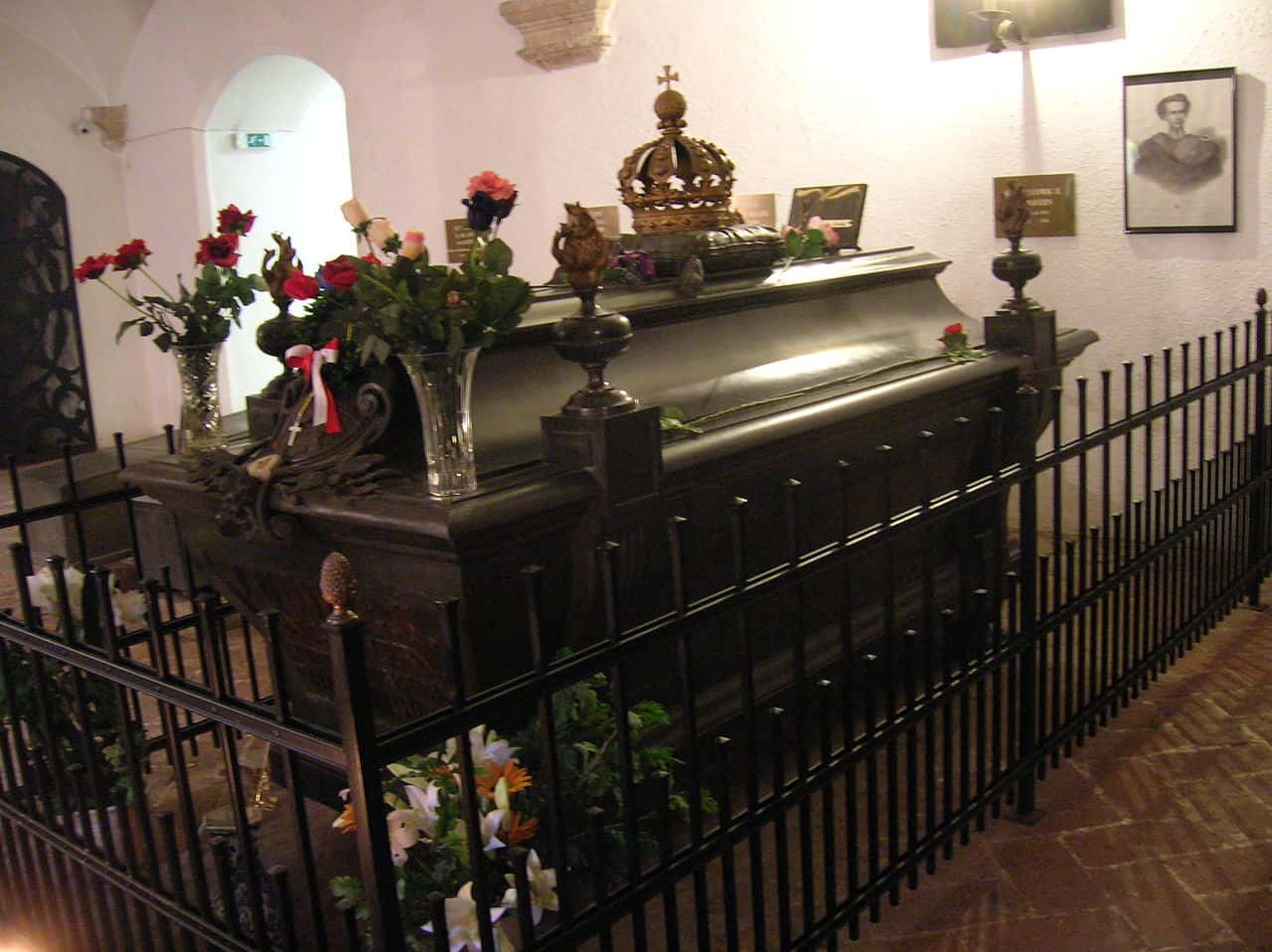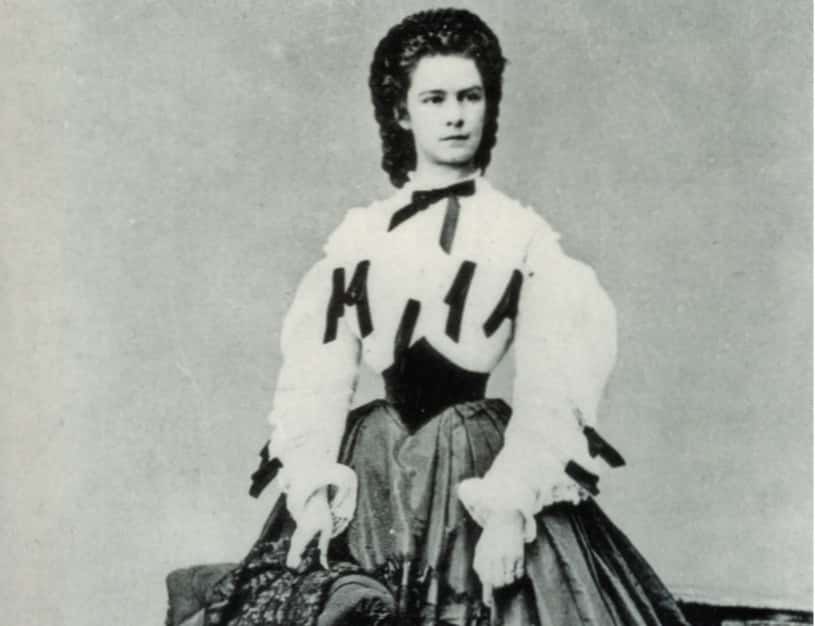"Mad" King Ludwig led a forbidden double life. He entertained a succession of gay lovers and spent millions on fairytale castles and lavish works of art. Living in his own enchanted dream world, the king failed to see the enemies at his back—and it led to one of the most twisted ends in history.
1. His Destiny Frightened Him
As the eldest son of Maximilian II of Bavaria and Marie of Prussia, Ludwig II entered a world of dazzling royalty and luxury—and his father never let him forget it. From the moment he was born in 1845, the pressures of duty began to stalk him. There was a chilling duality in his life. Despite the pampering and the indulgence, a cloud of expectation hung over him—and it molded his personality in the most unsettling way.
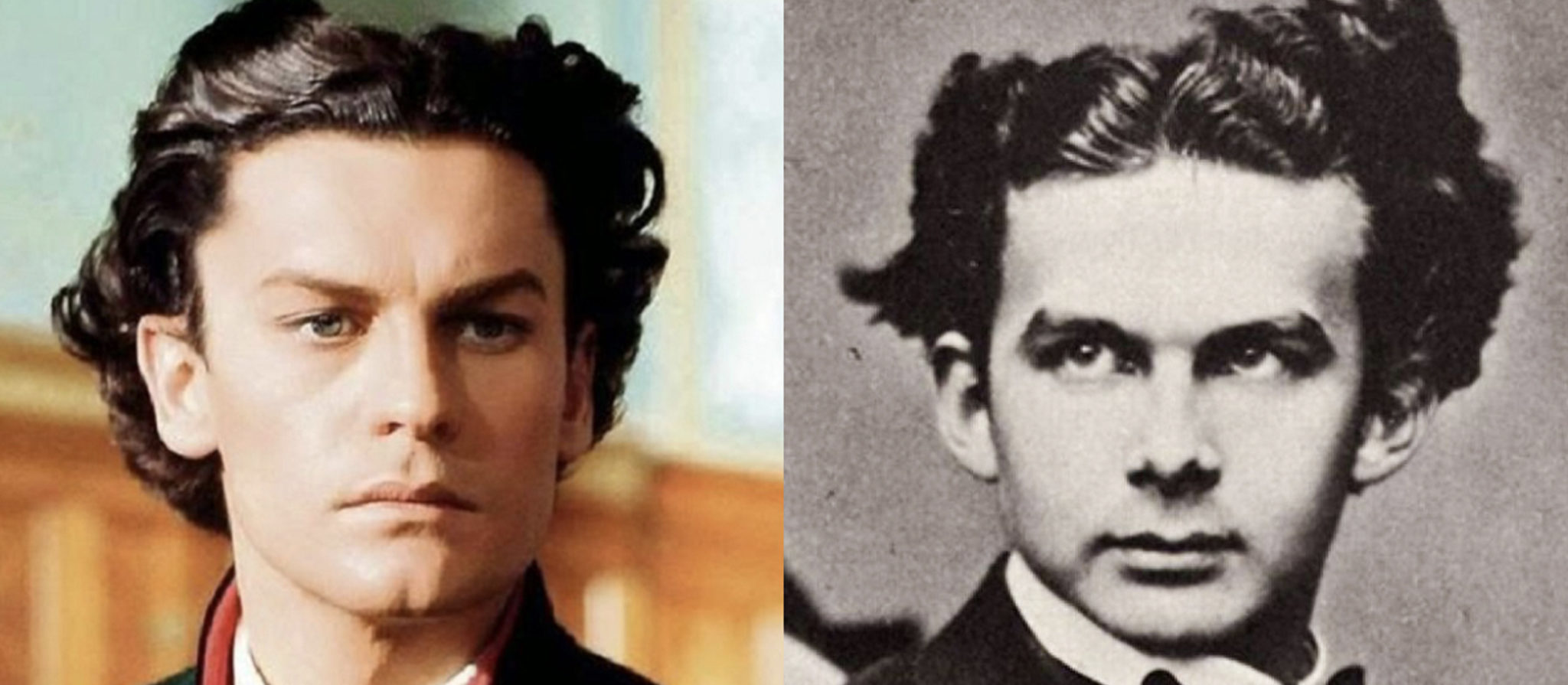
2. He Cowered Under Pressure
With his royal destiny sprawling out before him, young Ludwig rigorously prepared for his future duties. His tutors ruled him with an iron fist, laying down the law with an intense study and exercise regimen. The making of a prince was no easy task, but as Ludwig grew into a man, it became increasingly clear that he was a little bit...odd.
3. He Lived In His Head
Simply put, Ludwig's future reign was already doomed: He wasn't cut out to be a king. At his core, he was a lover of the arts and architecture—and his childhood served as the calm before the storm. He passed many joyous days at a fantasy-like castle that his father had built, Castle Hohenschwangau. Losing himself in this real-life fairy tale, Ludwig became an avid daydreamer and lived an insular life—but these eccentricities weren't the only things that set him apart.
4. He Chased The Fairy Tale
In 1863, Ludwig was assigned an orderly officer name Prince Paul—and the resulting intimacy changed his life forever. That autumn, the two adolescents spent three unforgettable weeks in each other's company: they went riding together, recited poetry for one another, and above all, shared a deep love for Richard Wagner. It was the beginning of Ludwig's most impassioned relationship, but—like everything else in the prince's life—it would only end in unspeakable heartbreak.
5. His Life Changed Forever
A year after meeting Paul, Ludwig's charmed life as a young prince came to a brutal halt. His father had come down with an unexpected illness, and, after three days of anxiety and worry, the king tragically passed. Suddenly, all the pressure that had been held over the young prince's head came crashing down around him. At only 19 years of age, Ludwig ascended the throne. Sadly, he was not ready—and boy, did it show.
6. He Wasn't Ready To Rule
Forget politics and state affairs, Ludwig was all about art, music, and architecture. Not long after ascending the throne, he got right down to "business" and summoned the one composer he was completely infatuated with—Wagner. He also flexed his newfound power and began building a new Court Theatre. It was an exciting, yet daunting, chapter for the new king—but throughout Munich, sordid rumors began to circulate.
7. He Had A Deep Obsession
Some suspected that Ludwig's total obsession with Wagner went beyond his adoration for the composer's work—and that he harbored deep romantic feelings for him. This attraction was likely never acted upon as Wagner himself had his own affair with a woman named Cosima (whom he later married). But this didn't stop Ludwig from pouring his royal heart out.
Wikipedia
8. He Confessed It All
Ludwig's enraptured letters to Wagner weren't subtle in the slightest. His romantic overtones were clear as day. However, although he was straight, Wagner's responses were jaw-dropping. Instead of rebuking the king's advances, he encouraged it. With a royal's purse in his back pocket, Wagner knew exactly what he was doing. He led Ludwig on with the most flowery, feigned script imaginable.
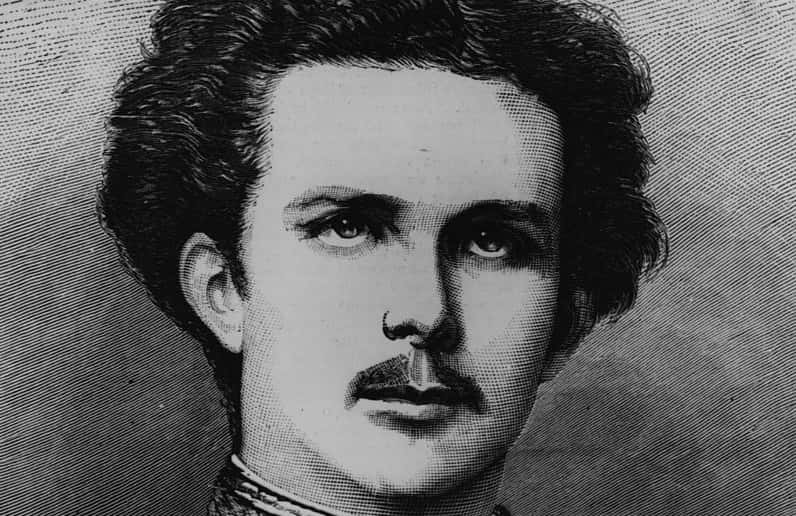 Getty Images
Getty Images
9. His Crush Led Him On
Basking in the glow of Ludwig's support, Wagner didn't hold back. His own letters often echoed the king's sentiments: "What bliss enfolds me! A wonderful dream has become a reality! How can I find words to describe to you the magic of this hour?... I am in your angelic arms. We are near to one another…" Wagner knew how to play the game to his advantage—but it almost ended in infamy.
10. He Fell Apart
In 1865, disaster struck. Due to the composer's scandalous behavior in Munich, Ludwig had no choice but to send Richard Wagner away. The king was a mess—and in a letter to Wagner's consort, he practically screamed in distress: "I tell you, I cannot bear to live apart from him much longer. I suffer terribly…this is no passing, youthful infatuation…"
Torn up by the separation, the king almost made the most drastic decision imaginable.
11. He Almost Sacrificed Everything
In order to be with Wagner, Ludwig even considered abdicating the throne. Luckily, the composer was able to talk the disturbed royal out of it. After all, his art relied heavily on the king's generosity and patronage. However, Ludwig's devotion to Wagner was only the tip of the iceberg. You see, when Ludwig ascended, he already had a romance brewing behind the scenes.
12. He Was Gay
When he became king, Ludwig's closest comrade, Prince Paul, became his loyal aide-de-camp. But Paul was far more than just a good "friend"...During this chapter of his life, Ludwig kept a diary in which he expressed his true feelings for other men. These entries, along with a number of private letters, pointed to one jarring truth: King Ludwig II was gay.
Since childhood, his friendship with Paul had grown into a deep love—and their correspondence practically dripped with mutual adoration.
13. He Fell In Love With His Best Friend
In 1966, Paul wrote a heartfelt letter to King Ludwig, with one excerpt reading: "Oh, Ludwig, Ludwig, I am consecrated to you! I couldn’t stand the people around me; I sat still and, in my thought I was with you...How my heart beats when, at the Residenz, I see a light in your window". Sadly, these star-crossed lovers never stood a chance: A world of problems stood between them.
14. He Repressed His True Feelings
Throughout his life, Ludwig had a difficult time reconciling his romantic desires and his Catholic faith. Out of shame and necessity, the king suppressed his true feelings as best he could. As a king, he had a responsibility to eventually marry and produce an heir. Sadly, his longtime affair with his childhood friend came to an end in 1866 after Paul himself found a wife of his own.
But as we'll see, Ludwig never truly escaped his darkest truth.
15. He Was A Loner
Although he was now a King, Ludwig was not the imposing force his father might've wished him to be. He despised large functions and tried to avoid social events at all costs. He was shy and creative and preferred to spend his time alone. Soon, his government ministers cast a suspicious eye over him. After all, what kind of king avoided his responsibilities?
Surprisingly, however, Ludwig had a powerful weapon at his disposal.
16. He Was Astonishingly Handsome
Although Ludwig's personality sparked tension among his peers, he managed to win the hearts of his people. You see, Ludwig had the face of a prince. He was young and astonishingly handsome, with his pictures boasting a brooding gaze, an immaculate hairstyle, and a strong presence. However, his looks weren't the only reason for the population's glowing approval.
17. His People Adored Him
Ludwig was far more than a pretty face. In the eyes of his people, the introverted king made up for his deficiencies by connecting with them one-on-one. With his love for travel, Ludwig would explore his own country, and get to know his people along the way. He'd even stop to have conversations with farmers and laborers. But that wasn't the most shocking part.
18. He Was A Romantic Hero
To those that offered him their generous hospitality, Ludwig bestowed luxurious gifts—and, even today, he is called Unser Kini, meaning "our cherished king". Because of these delightful interactions, he was exactly the royal his people wanted: He was the ideal romantic hero. But this was only the beginning. To truly secure his name, he had to complete one important task.
19. He Had To Produce An Heir
During his early reign, Ludwig felt the weight of expectation grow heavy: He needed to produce an heir. Although the king was secretly gay, he had no choice but to marry—and this particular hurdle became all the more pressing in 1867. With his arm twisted, Ludwig became engaged to his cousin, Duchess Sophie in Bavaria. But this was no "happily ever after".
20. He Didn't Love His Fiancée
Ludwig and Sophie bonded over one thing, and one thing only: Their love of Wagner. Only days before they announced their engagement, Ludwig had written to her saying, "The main substance of our relationship has always been...Richard Wagner's remarkable and deeply moving destiny". But was this enough to sustain a marriage? Absolutely not.
21. He Called It Off
Clearly, Ludwig didn't really have his heart in the game. He kept flip-flopping on his poor fiancée, postponing their wedding date over and over again. Finally, in October 1967, the fickle king called it off entirely. He felt like the whole affair had been thrust upon him, and he explained to Sophie that he only viewed her "like a sister". Of course, that wasn't the only reason for his hesitancy.
22. He Entertained A Handsome Distraction
Just when Ludwig was on the verge of tying the knot, he met a man that changed everything. In the summer of that year, the king fell head over heels for Richard Hornig, a groom that worked in his stable. They bonded over their love of riding and horses, and before long, they were seeing one another all the time. This handsome, blue-eyed Prussian stole Ludwig's heart—and took him on a wild ride.
 Ludwig II (2012), Bavaria pictures
Ludwig II (2012), Bavaria pictures
23. He Sparked Scandalous Gossip
Ludwig strongly favored Hornig, and soon, the groom had become the Crown Equerry and Master of the Horse. Together, they entertained numerous interludes, taking their clandestine meetings to remote castles and chalets. Unfortunately, the king took it a step too far. When Hornig began acting as a middleman between the king and his ministers, it unleashed lurid gossip and backlash. But this douse their passion? Not a chance.
 Ludwig II (2012), Bavaria pictures
Ludwig II (2012), Bavaria pictures
24. He Disguised Himself
While still engaged to Sophie, King Ludwig set out on a romantic journey with Richard Hornig, traveling to France—and the secret trip wasn't without intrigue. The king disguised himself under another name, presenting himself as Count von Berg. His growing intimacy with Hornig made it startlingly obvious that he'd never be able to devote himself to a woman.
No doubt, it was his romance with Hornig that led to the end of his engagement with Sophie. However, when it came to forbidden romances, the king was just getting started...
25. He Had An Affair With An Actor
While most kings had mistresses, Ludwig had ravishing male companions. Most notably, he sought out intimacy with Hungarian theater star Josef Kains, as well as courtier Alfons Weber. However, when it came to these conquests, the king showered most of his favor on Kainz, who brilliantly benefitted from this scandalous arrangement.
26. He Was Overly Generous
Ludwig spoiled his lovers with expensive presents and luxurious experiences. He even invited Kainz on a royal vacation to Switzerland. His generosity knew no bounds—both with his people and his paramours. Unfortunately, goodwill and the love of beautiful things couldn't save the king from veering down a very dangerous path.
27. He Lost The Country
Only two years after becoming king, Ludwig watched in dismay as Austria lost its independence, falling to Prussia during the Austro-Prussian War. But the fighting wasn't over yet. By 1870, the country had become a part of the German Empire. However, as a king never enthused by matters of state, Ludwig's mind was more concerned with his passion projects.
Slinking away from his political duties, the king set out to make his mark in a completely different way.
28. He Had An Opulent Dream
You see, when Ludwig visited France in 1867, he was awestruck. The country boasted the most gorgeous architecture. As he walked through the glittering Palace of Versailles, he began to envision the castles and chateaus he could build in his own country. He wanted to beautify the land as France had. It wasn't going to be easy—but the ambitious king was more than willing to make a great sacrifice to achieve his goals.
29. He Took A Risk
Desperate to see Bavaria studded with fairytale castles, the king dipped into his personal fortune to fund his projects. Ludwig felt fulfilled as his dreams slowly turned into realities. Today, the New Swanstone Castle and Linderhof Palace are magnificent examples of Ludwig's indelible legacy. But sadly, his passions laid the groundwork for his tragic fall from grace.
30. He Spent All Of His Money
Although Ludwig had meant well by refusing to take money from the state coffers, his soaring personal debt did not help Bavaria in any way. By 1885, the king found himself in a dire situation: He was 14 million marks in debt. He'd been wildly irresponsible by borrowing extravagant sums from his own family. However, when Ludwig's financial ministers advised him to economize—his response was sickening.
31. He Spurned His Advisors
Ludwig completely ignored any financial advice from his ministers and continued with his grandiose designs and dreams. He sought out loans from European royals, while simultaneously turning a cold shoulder to his stately responsibilities. His ministers were scandalized by this behavior—but their criticism only deepened Ludwig's annoyance with them.
Pestered and floundering, Ludwig made a grave mistake.
32. He Threatened Them
Tired of his cabinet's criticism, King Ludwig considered replacing all the ministers with brand new faces. This horrified the cabinet and they decided to take matters into their own hands. First and foremost, they had to depose Ludwig, but it had to be constitutional. They came up with the perfect solution—but it was unbelievably shady.
33. They Framed Him
Determined to overtake their king, the ministers decided to depose Ludwig by claiming that he was mentally ill. On the grounds of full-blown insanity, the king would be unable to rule. But they couldn't act right away. The ministers still needed proof, and unfortunately for Ludwig, they had an underhanded plan to get their hands on some very incriminating evidence.
34. His Servants Tattled On Him
The minister set their nefarious plan in motion. From January to March 1886, Maximilian Count von Holnstein began putting together a report that detailed Ludwig's insanity. He focused on the most vulnerable people in the king's circle—his servants. Using his intimidating rank, Holnstein bribed the servants to reveal Ludwig's darkest secrets.
35. His Bizarre Quirks Came To Light
In speaking with Holnstein, the servants confessed to witnessing Ludwig's bizarre quirks and odd behaviors: his severe shyness, his opulent indulgences, and his apathy toward matters of state. Oh, but then it got even more personal. They talked about his baffling desire to eat outside in frigid temperatures and wear warm clothes in the summer—something only a madman would do. Still, that wasn't the worst of it.
 Ludwig II (2012), Bavaria pictures
Ludwig II (2012), Bavaria pictures
36. He Was Dangerous
The servants also claimed that their king was aggressive and threatened their well-being. Armed with a report filled with fragile accusations, the conspirators brought their case to Otto von Bismarck, Chancellor of the German Empire, who immediately sniffed out a rat. He immediately doubted the report's accuracy, and called it "rakings from the King's wastepaper-basket and cupboards".
Bismarck suspected that the ministers just wanted to save themselves—but didn't do anything to disrupt their treacherous plans.
37. He Was The Victim Of Treachery
Bismarck's disapproval did nothing to change the conspirators' minds. In fact, they took their ruse a step further. They sought the help of four psychiatrists who put their stamp of approval on the report. This was, perhaps, the most traitorous move of all. All of these psychiatrists claimed that King Ludwig suffered from paranoia—but this was a blatant lie.
 Ludwig II (2012), Bavaria pictures
Ludwig II (2012), Bavaria pictures
38. His Madness Became Controversial
You see, all of these doctors, except for one, had never actually met the king. And they certainly hadn't examined him properly enough to confidently diagnose him with paranoia. This was a controversy in the making, and it didn't bode well for Ludwig. On June 10, 1886, a commission arrived at the king's doorstep at Neuschwanstein—and they were the bearers of the worst news possible.
39. He Tried To Defend Himself
Although the commissioners had arrived with deposition in hand, a loyal servant had tipped off King Ludwig hours in advance. This gave the king time to prepare: he ordered the authorities to guard him and to turn the unwanted visitors away. In the midst of all this drama, however, one of the most notorious sideshows in history went down, taking everyone by surprise.
40. He Had One Surprising Supporter
Not only did the commissioners face Ludwig's guard, but they also faced the wrath of one of the king's most loyal supporters—the baroness Esperanza de Sarachaga. She flew at them with her trusty umbrella, lashing out at them. After her impassioned outburst, she fled straight to Ludwig's side and identified every conspirator. He had them all arrested—but it was already too late.
41. He Panicked
The very same day, Ludwig's panic intensified. The government named Luitpold as the Prince Regent of Bavaria. As the brutal reality finally started setting in, the deposed king listened as all of his allies pleaded with him to either flee or present himself in Munich. Instead, he made the wrong choice, opting to make a brash statement about "planned treason" and "false allegations". But this was the nail in the coffin.
42. He Couldn't Escape
King Ludwig flailed in open water. Nobody believed the authenticity of his statement, and with his disappointing show of leadership, his supporters began to trickle off. To make matters worse, the police that had been called in to protect him were replaced by 36 new officers who sealed off the entrances to the castle. Ludwig was trapped—but this was only the beginning of the nightmare.
43. He Became A Captive
By the time Ludwig decided to throw in the towel and run, he'd waited too long. On June 12, a second commission seized him in the early morning. By 4 am, he sat in a waiting carriage, finally a captive. Distressed by this turn of events, King Ludwig asked one of the psychiatrists, Dr. Gudden, "How can you declare me insane? After all, you have never seen or examined me before". The doctor's response shook him to the core.
44. He Wouldn't Live To See The Sunrise
Gudden explained that he had no need to examine the king as the evidence against him was already "overwhelming". King Ludwig was transported to Berg Castle—but his stay there would be tragically cut short. You see, fate had another cruel twist in store for the failed king. The very next day, he and Dr. Gudden decided to take a walk along the shore of Lake Starnberg—and that was the last time anyone saw them alive.
45. He Went Missing
Ludwig and Gudden began their walk at 6:30 pm and were expected back by 8 pm, but they never arrived. A search party spent hours scouring the grounds in the pouring rain. Finally, at 10:30 pm, they made the most disturbing discovery. Both Ludwig and Gudden were found propped up in the shore's shallow water. It was a ghastly scene.
46. He Met A Horrific Demise
Although the king and Gudden had their head and shoulders above the water, they were both deceased. It was a mystery right from the get-go. At first, all signs pointed to suicide by drowning—but the autopsy report made some shocking conclusions. First of all, there hadn't been any water in Ludwig's lungs. And then there was the matter of Gudden's demise...
47. His Demise Was A Mystery
Gudden's body showed signs of severe blows to the head and neck, and it even looked as though he could have been strangled. Something had gone seriously wrong during this seemingly innocent stroll. Some started to speculate that Ludwig had tried to escape from Berg castle that day and that his enemies had sabotaged his plans. But what had really happened?
Shockingly, the king's personal fisherman, Jakob Lidl, held a missing piece of the puzzle.
48. His Fisherman Kept A Secret
Ludwig's fisherman, Lidl, confessed, "Three years after the king's death I was made to swear an oath that I would never say certain things—not to my wife, not on my deathbed, and not to any priest..". He kept his promise to the state and never spoke the truth, but after his passing, he did leave behind some tell-tale notes. These notes provided insight into what actually happened to King Ludwig on the day of his sudden demise.
49. He May Have Been Murdered
Lidl's notes illustrated King Ludwig's escape plan from Berg. The king had enlisted the help of the fisherman who was to row him out to the lake, where a group of loyal supporters waited for him. The plan went took a horrifying turn the second that Ludwig made contact with Lidl: "As the king stepped up to his boat and put one foot in it, a shot rang out from the bank, apparently killing him on the spot, for the king fell across the bow of the boat".
However, there was only one glaring problem with this series of events.
50. His Autopsy Was Confusing
King Ludwig's autopsy did not report any wounds on his body. Another theory wonders whether he just passed from natural causes caused by the cold water. The king might have suffered a heart attack or stroke during his escape. But the mystery doesn't end there. Arguments for his murder still reared their head, even years later.
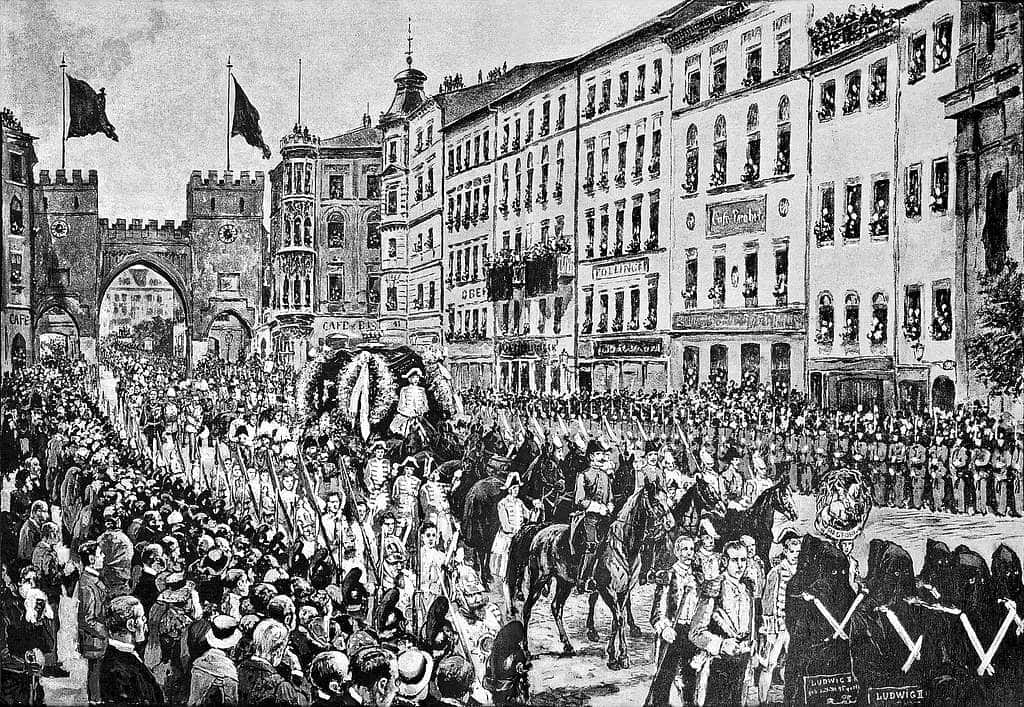 Picryl
Picryl
51. The Controversy Still Isn't Over
Down the road, Countess Josephine von Wrbna-Kaunitz presented a familiar-looking grey Loden coat to her guests during afternoon tea. She claimed that the coat belonged to King Ludwig himself. Turning it over in her hands, she pointed directly to two holes in the back of the coat. To the Countess, it was all the evidence she needed. In her eyes, King Ludwig II had been murdered.
52. He Was An Enigma
Much about Ludwig remains a mystery to this day as both his tragic end and mental state cannot be confirmed. According to one of his closest friends and cousins, Empress Elisabeth, she did not believe the horrid allegations placed against him: "The King was not mad; he was just an eccentric living in a world of dreams. They might have treated him more gently, and thus perhaps spared him so terrible an end".




